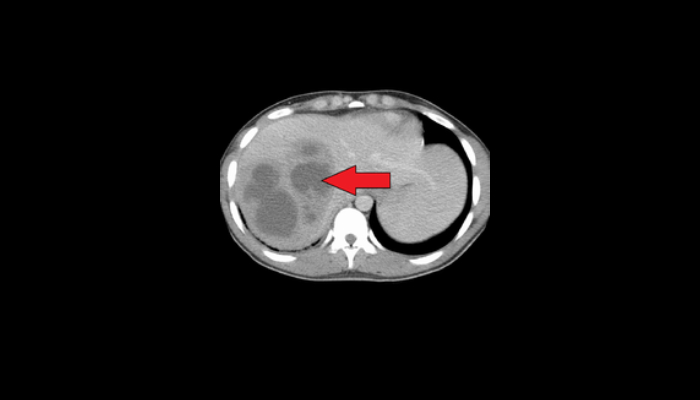What is a Liver Abscess?
Liver abscess is a pus-filled cyst in the liver. The liver is an organ in the digestive system that assists the digestive process and carries out many other essential functions. These functions include producing bile to help break down food into energy; creating essential substances, such as hormones; cleaning toxins from the blood, including those from medication, alcohol and drugs; and controlling fat storage and cholesterol production and release. Anyone can get a liver abscess. The condition can be caused by infections spread directly from nearby structures, such as the bile-draining tubes, from the appendix or intestines, or carried in the bloodstream from more distant parts of the body. A liver abscess can also develop as a result of surgery or other trauma to the liver.

Symptoms
- Abdominal pain (especially in the upper right portion of the abdomen)
- Clay-colored stools
- Cough
- Dark urine
- Diarrhea
- Fever or chills
- Joint pain
- Loss of appetite
What Causes a Liver Abscess?
Anyone can get a liver abscess. The condition can be caused by infections in the blood, gastrointestinal system, or abdomen. It can also be caused by injury from a surgical procedure or other trauma to the liver. Infectious causes of a liver abscess Liver abscess may result from the following infectious causes:
- Bacterial infection in the bile-draining tubes
- Bacterial infections in the abdomen associated with appendicitis, diverticulitis, or perforated bowel
- Bloodstream infections
- Entamoeba histolytica infection (organism that also causes amebic dysentery; may be spread through water or through person-to-person contact)
What Are The Risk Factors For A Liver Abscess?
A number of factors increase the risk of developing liver abscess. Not all people with risk factors will get liver abscess. Risk factors for pyogenic liver abscess include:
- Crohn’s disease
- Current, primary abdominal or gastrointestinal infection
- Diabetes
- Recent abdominal surgery
- Recent endoscopy of the bile-draining tubes
How Is a Liver Abscess Treated?
Liver abscess is treated with both medications and surgical drainage. If you have amebic liver abscess, after the liver infection is cured, you will probably be prescribed another drug to kill any amebas remaining in the intestines so as to prevent recurrence of the abscess. Surgical treatment of liver abscess is necessary in many cases to drain the abscess with a needle or small tube inserted through the abdomen. This surgical procedure is called laparoscopic or percutaneous drainage and aspiration.
What Are The Potential Complications of a Liver Abscess?
Complications of untreated or poorly controlled liver abscess can be serious, even life threatening in some cases. You can help minimize your risk of serious complications by following the treatment plan that you and your health care professional design specifically for you. Complications of liver abscess occur from rupture and include:
- Empyema (pus accumulation in the chest)
- Endocarditis (inflammation of the heart lining and heart valves)
- Liver failure
- Pleural effusion (accumulation of fluid around the lungs)
- Sepsis (life-threatening blood infection)
- Spread of infection
